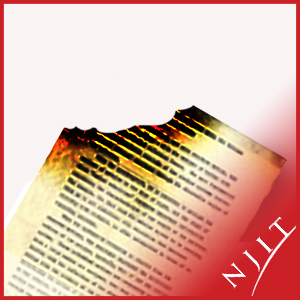The End of the Essay
 We launched a new podcast series in iTunes U this week called "The End of the Essay." It's a project that I've been working on with Dr. Norbert Elliot, Professor of English at NJIT. Norbert had given a presentation last spring for the NJEDge.Net DLAAB group called "The End of the Essay: Writing in a Mediated Environment." I thought it was something he should develop into a book, but he was already involved in another book project.
We launched a new podcast series in iTunes U this week called "The End of the Essay." It's a project that I've been working on with Dr. Norbert Elliot, Professor of English at NJIT. Norbert had given a presentation last spring for the NJEDge.Net DLAAB group called "The End of the Essay: Writing in a Mediated Environment." I thought it was something he should develop into a book, but he was already involved in another book project.
Then I did an interview with him about some of the ideas in that presentation and we posted it on our NJIT website, and that got some attention. So, I suggested he turn the topic into a podcast series. Norbert has been one of our earliest podcasting professors. His two world literature courses are offered in our iTunes U "Open Courseware" area and are two of our most downloaded podcasts.
We decided that we'd like this series to be more than just a podcast though. Something I haven't seen in iTunes U so far are podcasts (courses or otherwise) that are interactive. You download the podcast, listen and then... what?
So this is an interactive podcast series and our purpose is to invite discussion on the strengths and limits of education’s dominant reporting structure - the essay - and we hope that this series will become interactive with listeners joining the conversation online.
There's precedent for the series title. We already have The End of History and The End of Science, for example. If you've read either of those books, you probably concluded that neither author really believed their subject was ending - but the titles are thought-provoking (and were probably chosen by their publishers anyway).
The book I might compare this series to is Sven Birkert's The Gutenberg Elegies: The Fate of Reading in an Electronic Age which was published in 1994. It was an interesting book when I read it back then, but I wasn't convinced by his argument that there was a direct correlation between the increasing use of the internet and declining literacy. The book didn't have much evidence and seemed to have been inspired by his classroom experiences. His literature students couldn't seem to get into the readings (I think it was Henry James) and he blamed technology. (I had trouble with Henry James as an undergrad myself and I had no Internet & little technology to distract me.)
Professor Elliot isn't blaming technology for killing the essay. In fact, I think since he is a very active user of technology in his teaching, he sees it as a way to expand our definition of "the essay."
For example, he would probably be very interested in an experimental composition course at the University of Illinois at Urbana-Champaign called "Writing With Video" that is pulling in students from art and design, cinema studies, computer science, creative writing, media studies and psychology.
For our new series, we have created a wiki where listeners can join a conversation about the end of the essay.
This week we launched the series with that original interview that I did with Norbert, a brief video conversation (the Prologue) we had about some ideas that led us to this series, and his first presentation titled "Act 1: Allegory (Five Easy Pieces)" and we plan to upload a new "act" each week for the next four weeks. After that? We are waiting to see where our listeners lead us.
Norbert asks you on the wiki this week, "What would happen if the essay were abolished in education?"
Is it incorrect to identify the essay as the dominant reporting structure in American education? We can certainly look to the Writing Section of SAT Reasoning Test for evidence that the essay form remains a dominant reporting structure in education. And while the NAEP Writing Assessment does ask for more diverse discourse forms, the timed nature of the sample does lend itself to a formulaic approach, the kind associated with the five paragraph format of the essay. It is, as the series suggests, the reductionistic and formulaic structure of the essay that is objectionable. Why? Because of the impact.
And here, sadly, is the impact: what gets tested gets taught. Hence, when high school students come to college, many of the formulaic approaches to writing are . . . ? Reified with even more essays? Radically questioned? The answer, of course, is that it depends on the orientation of the teacher (a graduate student writing essays in a literature program or a graduate student designing web sites while pursuing a doctorate in rhetoric), on the level of her support (an adjunct with subsistence level pay or a supported tenure-track member of a department).
I'd like to see teachers in secondary schools also join our conversation and I hope some of you who read this blog will download the podcasts in iTunes U (see links below) and check out the wiki and blog.
As someone deeply involved with empirical assessment throughout his career, Norbert recognizes that the task of coming to terms with what is really happening in our nation's classrooms is very difficult to capture.
- Listen to the weekly podcasts, available in NJIT on iTunes U for guests and the NJIT community.
- Participate in our wiki discussion
Comments
No comments